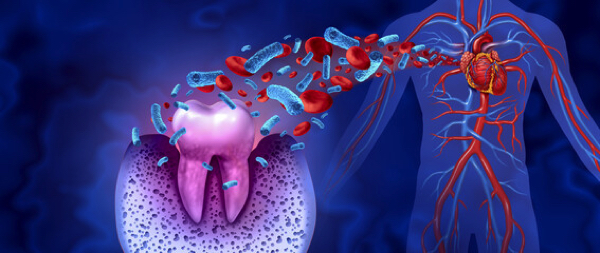 Parler
Parler Gab
Gab
- A landmark clinical trial establishes that treating severe gum disease directly reduces a key marker of cardiovascular risk.
- Chronic oral infections cause systemic inflammation and allow bacteria into the bloodstream, damaging blood vessels.
- Experts call for an end to the historical separation between dental and general medical care.
- Approximately 40 percent of U.S. adults have a periodontal disease, a widespread but modifiable health risk.
- Comprehensive oral hygiene, professional cleanings and addressing overall inflammation are critical for protecting both oral and heart health.
The proof is in the plaque
The gold-standard randomized trial, conducted at a London dental hospital, put the mouth-heart connection to the test. Researchers enrolled 135 otherwise healthy individuals with severe periodontitis, the advanced stage of gum disease. After using ultrasounds to establish a baseline thickness of their carotid arteries—a major predictor of heart attack and stroke risk—participants were divided into two groups. One received intensive periodontitis treatment, including deep cleaning below the gumline to remove entrenched plaque and tartar. The control group received only standard cleanings. After two years, the results were striking. The individuals who received the intensive gum therapy had significantly less thickening of their carotid arteries. Study co-author Dr. Francesco D’Aiuto noted that this improvement was "comparable to what has been seen with lifestyle interventions and some pharmacological agents." The treated group also showed better blood vessel function and lower levels of inflammatory markers in their blood, both critical factors in the development of atherosclerosis, the dangerous narrowing and hardening of arteries.The systemic pathway from gums to heart
The biological mechanism linking a mouth infection to a heart condition is not mysterious. The mouth is home to over 700 species of bacteria. In periodontitis, the gums pull away from the teeth, creating deepened pockets that become reservoirs for harmful bacteria, far beyond the reach of a toothbrush or floss. This creates a chronic state of infection and inflammation. "The mouth-heart connection isn't mysterious," the evidence shows. Bacteria from these infected pockets readily enter the bloodstream through everyday activities like chewing and brushing. Once in circulation, these pathogens trigger a widespread inflammatory response as the immune system fights the invasion. This chronic, systemic inflammation damages the inner lining of blood vessels throughout the body and accelerates the formation of arterial plaque. Furthermore, the bacteria themselves can latch onto existing fatty deposits in artery walls, contributing directly to blockages. This process explains the robust statistical links between gum disease and a 28 percent higher risk of heart attack.Bridging the great divide in patient care
The implications of this research are catalyzing a paradigm shift, challenging the historical siloing of dental and medical professions. For too long, a patient's oral health was considered separate from their overall physiological well-being. Dr. Maurizio Tonetti, a clinical periodontist at the University of Hong Kong, crystallized this long-standing problem, stating, “For many, many years, dentists have been focusing on the teeth, forgetting the rest of the body, and physicians have been focusing on the body, forgetting that there are teeth.” This new evidence positions severe gum disease not as a mere dental nuisance, but as a modifiable risk factor for cardiovascular disease, similar to high blood pressure or cholesterol. The findings reinforce the view that comprehensive patient care must integrate oral systemic health. As one analysis of insurance records found, people with cardiovascular disease who received periodontal treatments had subsequently lower medical costs and fewer hospitalizations, suggesting that managing oral infection helps the body respond better to other medical treatments.An action plan for oral-systemic health
Given that an estimated 40 percent of U.S. adults have some form of periodontal disease, the opportunity for prevention is immense. Protecting both smile and heart requires a proactive and consistent approach. Key strategies include:- Professional intervention: Do not ignore bleeding gums, persistent bad breath, or receding gums. These are signs of active disease requiring professional care. Regular dental checkups and cleanings are essential, and those with signs of periodontitis may need a deep cleaning (scaling and root planing) to remove toxic bacteria from below the gumline.
- Enhanced home care: Brushing twice daily and flossing remain the foundation, but they are often insufficient alone. Using an oral irrigator can help flush out bacteria from deep gum pockets. Oil pulling with coconut or sesame oil is a traditional practice shown to reduce plaque and harmful microorganisms.
- Addressing root causes: Gum disease often reflects broader health issues. Supporting the immune system through an anti-inflammatory diet rich in vitamin C, Coenzyme Q10 and omega-3 fatty acids, while eliminating processed foods and sugar, is critical. Proper sleep and stress management also help control the systemic inflammation that fuels both gum and heart disease.
A prescription for unified wellness
The message from the latest science is unequivocal: the health of the mouth and the body are inextricably linked. The historical wall between the dental chair and the doctor's office is crumbling under the weight of evidence that a healthy mouth is a cornerstone of a healthy heart. What was once a theoretical connection is now a clinically proven causal pathway. For the millions navigating the risks of cardiovascular disease, this research offers a powerful and accessible modifiable factor. The simple, daily acts of meticulous oral hygiene, combined with professional care, are no longer just about preserving a smile, but are a vital prescription for safeguarding the heart. Sources for this article include: NaturalHealth365.com Health.Harvard.edu NYPost.comScientists discover a shocking new way to breathe – through the gut
By S.D. Wells // Share
Nvidia shatters records as first $5 trillion company amid AI boom, but bubble fears loom
By Kevin Hughes // Share
New study uncovers how common vaping ingredient transforms into potent lung toxins
By Ava Grace // Share
Canadian study on euthanasia-linked organ donation sparks ethical debate
By Patrick Lewis // Share
Governments continue to obscure COVID-19 vaccine data amid rising concerns over excess deaths
By patricklewis // Share
Tech giant Microsoft backs EXTINCTION with its support of carbon capture programs
By ramontomeydw // Share
Germany to resume arms exports to Israel despite repeated ceasefire violations
By isabelle // Share









